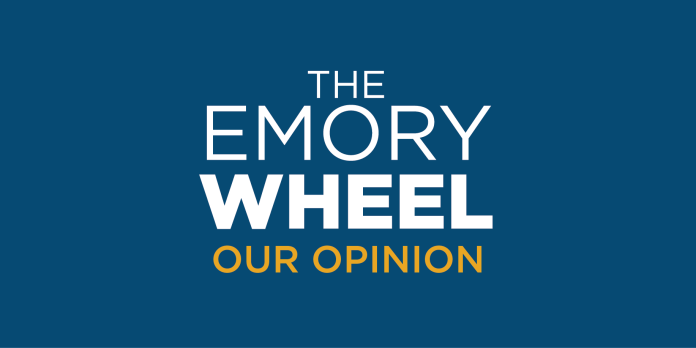Following deliberation on the organization of the Wheel’s editorial board, we believe that it is in the best interest of the Wheel to change the current editorial system so as best to serve the Emory community. In its present form, the Editorial Board consists of the editor-in-chief, executive editor, managing editors, section editors, assistant section editors, photo editors, layout editors, social media editors and digital editors. However, under the new approach, the Editorial Board will exist as an entity independent from the Wheel’s reporting arm.
The reorganization of the Board comes in light of events that highlighted the difficulty of the paper both to report upon high-magnitude stories and simultaneously to develop a staff editorial–that being the paper’s official opinion–on those same topics. Last spring, the Wheel covered protests that followed pro-Trump chalkings across campus. In order to protect the integrity of the Wheel’s news coverage of the events, it was necessary to temporarily remove, or, in some cases, revoke the voting privileges of, members of the Editorial Board in the paper’s staff editorial discussions. Those involved in the reporting needed to remain objective and unbiased, and those involved in making commentary needed to take a position. While the Wheel is confident in the position it took on the events, our current Editorial Board voted to amend our constitution in order to create a better system for the future.
Inspired by the editorial systems in place at other college newspaper such as Princeton University’s The Princetonian and professional newspapers such as The New York Times, the new system will serve to modernize the paper and be representative of the current best practices in journalism. These papers establish firm boundaries between editorial and reporting staff, and this serves as a guarantee to their readerships that there is a bona fide effort to maintain unbiased and accurate reporting on events relevant to them.
Operating with transparency and without anonymity, the new Editorial Board will first research an issue important to the community independently of the rest of the Wheel, and then convene to debate and to develop a staff editorial under the Wheel’s name. This will be differentiated from independently written op-eds and columns, which will continue to represent the opinions and efforts of individual writers. However, the members of the editorial board will be encouraged to write these independent op-eds in addition to their contributions to the staff editorial.
The Wheel’s new editorial board will consist of between nine and 15 students. This group will ideally have the resources and diversity necessary to formulate and express an opinion that is representative of Emory’s community, and will report directly to the editor-in-chief. Beginning today, the Wheel will be accepting applications for potential members, with the ultimate aim of constructing a board that best represents the wider Emory community.
If you are at all interested in joining the editorial board, please apply online at bit.ly/WheelEB.
The above staff editorial represents the majority opinion of the Wheel’s editorial board.
The Emory Wheel was founded in 1919 and is currently the only independent, student-run newspaper of Emory University. The Wheel publishes weekly on Wednesdays during the academic year, except during University holidays and scheduled publication intermissions.
The Wheel is financially and editorially independent from the University. All of its content is generated by the Wheel’s more than 100 student staff members and contributing writers, and its printing costs are covered by profits from self-generated advertising sales.





